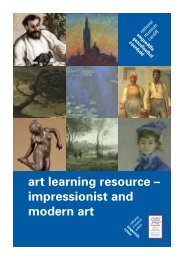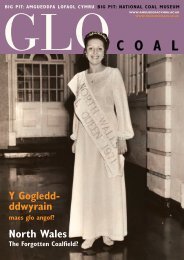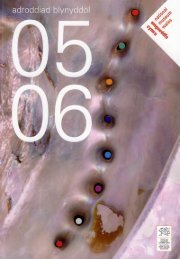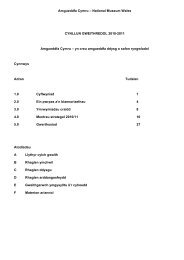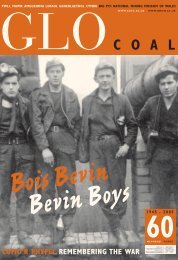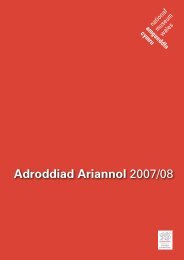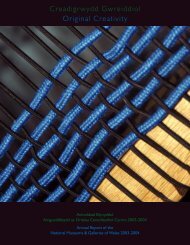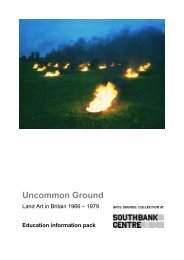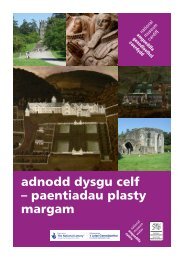Create successful ePaper yourself
Turn your PDF publications into a flip-book with our unique Google optimized e-Paper software.
Llygod mawr<br />
fel cathod!<br />
Rats like cats!<br />
Ymunais â’r Gwarchodlu Cartref ym mis Mai<br />
1940 ar ôl clywed araith enwog Winston<br />
Churchill ynglŷn â’n cefnau yn erbyn y wal.<br />
Wyddoch chi, honno a oedd yn sôn rhywbeth am<br />
‘We’ll fight them on the streets’ ac ati. Fe es i swyddfa’r<br />
heddlu ac ymuno’n syth bin. Ar ôl hynny, roeddwn i’n<br />
gweithio o danddaear yn ystod y dydd ac yn rhedeg ar<br />
hyd a lled y mynyddoedd gyda’r nos cyn cael ychydig<br />
oriau o gwsg. Yn y Gwarchodlu Cartref y gwelais i’r<br />
enghrai orau o frawdoliaeth. Pan es i’r ysbyty ar ôl<br />
damwain danddaear, daeth y platŵn cyfan i’m gweld,<br />
pob un yn sefyll o amgylch fy ngwely. Cefais becyn o<br />
bum sigarét gan un ohonyn nhw. Allech chi ddim cael<br />
sigaréts bryd hynny, a rhai ‘Pasha’s’ oedden nhw. Ar ôl<br />
rhoi’r sigaréts i mi, gofynnodd, ‘Alla i ga’l rhywfaint i<br />
fynd yn ôl ’da fi? Wy ddim di cael mwgyn drw’r dydd’.<br />
Roedd newydd roi pum sigarét i mi, a dyma fi’n gorfod<br />
rhoi eu hanner nhw’n ôl.<br />
Rhai o gyn-filwyr rhyfel 1914 oedd aelodau<br />
cynta’r Gwarchodlu Cartref, a gan eu bod nhw’n hen<br />
lawiau ar drin arfau, fe gawson nhw ddrylliau pelets.<br />
Ni chafodd y gweddill ohonom ynnau tan i’r<br />
Americanwyr anfon cesys o reiffls atom, a dyna’r rhai<br />
ddefnyddion ni gydol y rhyfel. Roedden nhw’n<br />
seimllyd ofnadwy, ac roedd rhaid i ni eu glanhau.<br />
Dwi’n credu bod rhyw 140 ohonom yn y platŵn, ac<br />
roedden ni’n gwneud tri pharêd yr wythnos. Bydden<br />
ni’n ymarfer tanio ein reifflau ar draws argae<br />
Treherbert. Arhosais gyda’r Gwarchodlu Cartref tan<br />
iddo gael ei ddirwyn i ben.<br />
Pan ddes i allan o’r ysbyty, es i weld Mr Oliver,<br />
rheolwr y lofa, i ofyn am swydd. Roedd cadeirydd<br />
cyfrinfa’r lofa yn digwydd bod yno a gofynnodd,<br />
‘Odych chi am roi cyfle i’r bachan hwn? Gath e<br />
ddamwain, mae ei fam yn wraig weddw a ma’ da fe<br />
ddou frawd anabl – beth am roi cyfle iddo fe?’ Ta<br />
beth, cefais swydd gyda dyn o’r enw Tommy Taylor<br />
‘tyllwr’ (gweithredwr driliau) a oedd wedi gweithio<br />
ym Mecsico; roedd e dros 60 oed, yn llai na fi hyd yn<br />
oed ac yn llawn ‘dwst’ (silicosis).<br />
Roeddwn i’n gorfod sefyll y tu ôl i Tommy wrth<br />
iddo ddrilio twll, ac yna byddwn i’n gwthio’r handlen<br />
yng nghefn y peiriant tan i’r rhoden gyrraedd y pen.<br />
Yna, byddwn i’n rhoi rhoden ddrilio ac un arall nes bod<br />
gennym ddril chwe throedfedd. Rhoddodd Tommy'r<br />
gorau iddi yn y diwedd am na allai weithio mwyach,<br />
roedd yn rhy hen a’i frest yn rhy ddrwg oherwydd y<br />
llwch. Felly, daeth y rheolwr ata’ i a gofyn ‘Wnei di ddal<br />
ati ar dy ben dy hun?’. Atebais i ‘Iawn’ cyn meddwl, ‘Y<br />
twpsyn i ti!’. A dyna’n swydd i, felly. Prin y gallwn i<br />
gerdded oherwydd fy nghoes stiff, ac roedd rhaid i mi<br />
gario’r holl gyfarpar o dalcen i dalcen, yn tyllu.<br />
Sylvanus Thompson, ei fab Mike (gyda’r bat<br />
criced a wnaed adeg y streic) a ‘Sally’<br />
Un diwrnod, daeth y rheolwr ata i a gofyn, ‘Liciet<br />
ti gael jobyn yn gyrru’r injan halio?’. ‘Iawn te’,<br />
meddwn i, a dyma’r bachan hyn yn dangos i mi sut i<br />
yrru’r injan a’n gadael i wrthi. Fe wnes i hynny am<br />
bedair blynedd. Priodais wedyn, a gofynnodd fy<br />
nghymydog ‘Mr omas, pam na ddewch chi ’da ni i<br />
Lundain i glirio llanast y bomio, mae’n arian hawdd<br />
am y nesaf peth i ddim. Ond mae’n rhaid i chi gwpla<br />
yn y lofa achos mae’n rhaid i chi fod yn ddi-waith er<br />
mwyn gwneud cais’. Felly, ymddiswyddais a mynd ar<br />
y dôl. Dyna pryd y ganwyd fy mab. Bues i’n ddi-waith<br />
am chwe wythnos, ac yna daeth y dyn yma’n ôl o<br />
Lundain a mynd â 41 ohonom yno.<br />
Erbyn hyn, roedd hi’n 1946. Prin dri mis fues i yn<br />
Llundain pan gefais alwad gan y Llu Awyr. Es i’n ôl<br />
adref a chael gair gyda rheolwr y lofa a ddywedodd na<br />
fyddai rhaid i mi fynd, fel glöwr, felly dechreuais<br />
weithio fel glöwr eto. Gofynnodd rhywun i mi, ‘Pan<br />
na ei di lan i’r lefelau newydd? Mae’n neisiach fan’ny,<br />
yn sych braf ’. Felly es i weld y rheolwr a roddodd fraw<br />
i mi. Mewn gwirionedd, roedd y bachan a oedd wedi<br />
canmol y lefelydd gymaint yn gweithio yn y pwll islaw<br />
Lefel Moscow lle’r es i i weithio. Lle’r oeddwn i, roedd<br />
y dŵr i fyny at eich fferau. Dim ond rhyw dri mis<br />
barodd hynny, a gofynnais a gawn i fynd i’r pwll<br />
Sylvanus Thompson, with son, Mike (with the<br />
cricket bat made during the strike) and Sally<br />
Ijoined the home guard in May 1940 aer Winston<br />
Churchill made his ‘backs to the wall’ speech. You<br />
know, the one that said “We’ll fight them on the<br />
streets” or something like that. I went to the police<br />
station and joined straight away. Aer that I was<br />
working underground during the day and running<br />
about the mountains in the night, we were only<br />
having a few hours sleep. e finest comradeship I<br />
have ever seen was in the Home Guard. When I went<br />
into hospital aer an accident underground, the<br />
whole platoon came in to see me all stood by the bed.<br />
One gave me a packet of five fags. You couldn’t get fags<br />
then and they were ‘Pasha’s’. Aer giving me the fags,<br />
he said “Can I have some to go back with? I ain’t had<br />
a fag all day.” He just brought me five fags and I had<br />
to gave him half back.<br />
e Home Guard started off with a lot of people<br />
who had been in the 1914 war and because they were<br />
experienced with handling guns they were given shot<br />
guns. e rest of us didn’t have guns until the<br />
Americans sent us cases of rifles over and those are<br />
the ones that we used all through the war. ey were<br />
covered in grease and we had to clean them up. I think<br />
there were about 140 of us in the platoon and we did<br />
three parades a week. We used to practice firing our<br />
rifles across Treherbert Dam. I stayed in the Home<br />
Guard until they were disbanded.<br />
When I came out of hospital I went up to see Mr<br />
Oliver the colliery manager to ask him for a job. e<br />
chairman of the union lodge was there and said “Are<br />
you going to give this boy a start? He has had an<br />
accident, his mother is a widow and he has two invalid<br />
brothers – give him a start?” Anyway I got a job with<br />
a chap called Tommy Taylor a ‘borer’ (drill operator)<br />
who had worked in Mexico; he was over 60, even<br />
smaller than me and full of ‘dust’ (silicosis).<br />
I had to stand behind Tommy while he was boring<br />
the hole and I’d be shoving the handle at the back of<br />
the machine until it was driven in and then I’d put a<br />
longer drill rod in until we ended up with the full six<br />
foot drill rod. Tommy eventually finished because he<br />
couldn’t do the work any more, he was too old and his<br />
chest was so bad because he was full of dust. So the<br />
owner came on to me and said “Will you carry on<br />
doing this job on your own?” I said “Righto”, but I<br />
thought, “You fool, man!” So that was my job, I had a<br />
stiff leg and could hardly walk and I had to carry all<br />
the equipment around the stalls, boring holes.<br />
One day the manager came on to me and said<br />
“Would you like to have a job driving the haulage<br />
engine?” “Aye” I said, so the chap that was on there<br />
showed me how to drive the engine and le me to it<br />
and I did it for four years. I got married about then<br />
and the chap that was living next door came in and<br />
said “Look Mr. omas why don’t you come up with<br />
us to London sorting out the bomb damage, its money<br />
for old rope up there. But you got to finish in the<br />
colliery as you have to be on the dole to apply for the<br />
job”. So I put my notice in and signed on the dole.<br />
at’s when my son was born. And I was on the dole<br />
then for about six weeks and then the chap came<br />
down from London and took forty-one of us back<br />
It was then 1946 and I had only been up there three<br />
months when I got called up for the Air Force. I went<br />
back home and had a word with the colliery manager<br />
who told me that, as a miner, I wouldn’t have to be<br />
conscripted so I started back as a miner again. A chap<br />
said to me “Why don’t you go up on the new levels? It’s<br />
lovely up there, its nice and dry.” So I went up to the<br />
manager and he gave me a start. e chap who had<br />
told me how nice the levels were was actually working<br />
in the pit below the Moscow Level where I went to<br />
work. Where I was there was water up to your ankles<br />
so I only stuck that for about three months and I asked<br />
if I could go to the new pit in the ‘Hook and Eye’ (Glen<br />
Rhondda Colliery), and I got a job as a labouring<br />
assistant to the repairer. I was there for about three<br />
months and the overman came around and said<br />
“Would you take on the job as repairer?” I said “I don’t<br />
16 17



